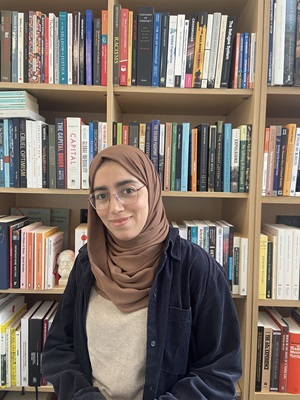News and Events
Africa–Ireland Migration and Mobilities Systems

Dr Kheira Arrouche is a Postdoctoral Research Fellow on the MIGMOBS project at University College Cork, where she leads a study on African migration and mobility in Ireland. Her research focuses on four key African migrant communities: Nigerians, Somalis, Algerians, and South Africans, examining how these groups navigate Ireland’s evolving migration regime and transnational mobility networks.
https://www.peoplesrepublicofcork.com/articles/every-fela-is-welcome-in-cork
 Kheira holds a PhD in Sociology from the University of Leeds and brings extensive research experience on African migrants in North African contexts. Building on this foundation, her current work investigates how African mobilities toward less conventional European destinations such as Ireland are shaped by global inequalities and shifting geopolitical landscapes. Ireland presents a particularly compelling yet underexplored case: historically an emigration country, it has undergone a significant transformation since the 1990s into a destination for growing numbers of migrants. This shift has drawn attention to the arrival of asylum seekers and refugees from African countries, leading to pivotal developments such as the 2004 constitutional referendum, which revoked the automatic right to citizenship. This moment illustrates how legal and symbolic boundaries of national belonging have been redrawn often along racial lines with direct implications for African migrants. Despite its significance, the intersection of race, legal status, and national identity remains underexamined in Irish migration scholarship.
Kheira holds a PhD in Sociology from the University of Leeds and brings extensive research experience on African migrants in North African contexts. Building on this foundation, her current work investigates how African mobilities toward less conventional European destinations such as Ireland are shaped by global inequalities and shifting geopolitical landscapes. Ireland presents a particularly compelling yet underexplored case: historically an emigration country, it has undergone a significant transformation since the 1990s into a destination for growing numbers of migrants. This shift has drawn attention to the arrival of asylum seekers and refugees from African countries, leading to pivotal developments such as the 2004 constitutional referendum, which revoked the automatic right to citizenship. This moment illustrates how legal and symbolic boundaries of national belonging have been redrawn often along racial lines with direct implications for African migrants. Despite its significance, the intersection of race, legal status, and national identity remains underexamined in Irish migration scholarship.
Kheira’s project responds to these historical and contemporary dynamics by exploring the complex interplay between formal migration systems and other transnational African mobilities to Ireland and, to some extent, the UK. The project recognises that these mobilities both contest and reproduce colonial legacies. On one hand, they can reflect acts of resistance, agency, and solidarity that challenge entrenched racial and economic hierarchies. On the other, they may reinscribe colonial patterns through exploitative labour systems, precarious legal statuses, or displacement driven by political and environmental crises.
A distinctive dimension of this project explores how African migrants navigate the ‘soft’ and ‘invisible’ Ireland–UK border. The research investigates how different migrants’ groups strategically use, or are restricted by, this free movement zone, exposing the uneven operation of mobility rights in Europe. Far from being merely a legal or geographic boundary, this ‘in-between site’ is a dynamic space where migrants’ transnational social fields unfold. Everyday cross-border practices such as travel, remittances, and community-building, reflect and sustain transnational ties, particularly with co-nationals in the UK. By foregrounding these practices, the study rethinks border as lived and contested, challenging static notions of European border and highlighting mobility as central to migrants’ transnational lives.
Through biographical interviews and focus groups with migrants from Algeria, Nigeria, Somalia, and South Africa, the study examines how individuals navigate, contest, and at times subvert the institutional categories imposed upon them. It also explores how migrants engage in self-organization and collective mobilisation as strategies of resistance and expressions of agency within structurally unequal systems. Furthermore, it investigates how overlapping systems of migration governance, classification, and control produce racialised and classed inequalities among African migrants.
In addition to her current project, Kheira is preparing a book based on her ethnographic PhD thesis, Racialised (Im)Mobilities: Producing West and Central African Migrants‘ illegality in Algeria. Centring migrant narratives and lived experiences, the book challenges dominant migration discourses and sheds light on Algeria’s complex role as both a transit and deviant destination country within African and Euro-Mediterranean migration politics.
Working in close collaboration with Prof. Adrian Favell, Kheira hopes to advance theoretical and empirical understandings of how African migration reflect and reshape the continuities and disruptions of colonial and postcolonial histories.
